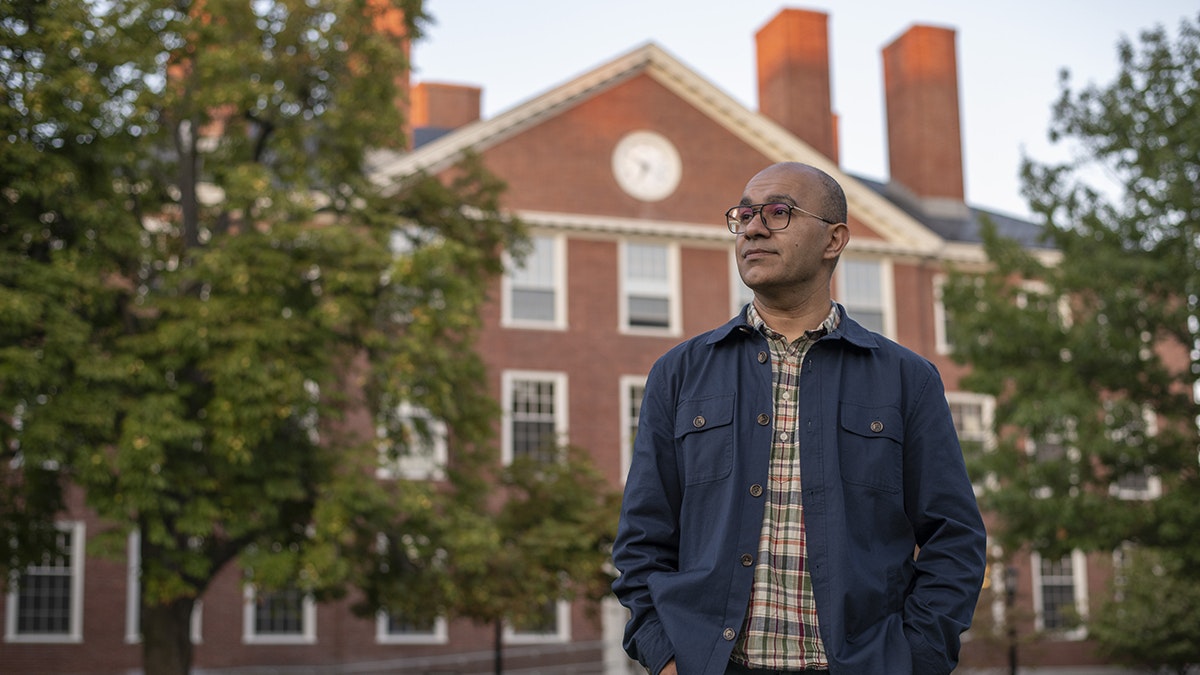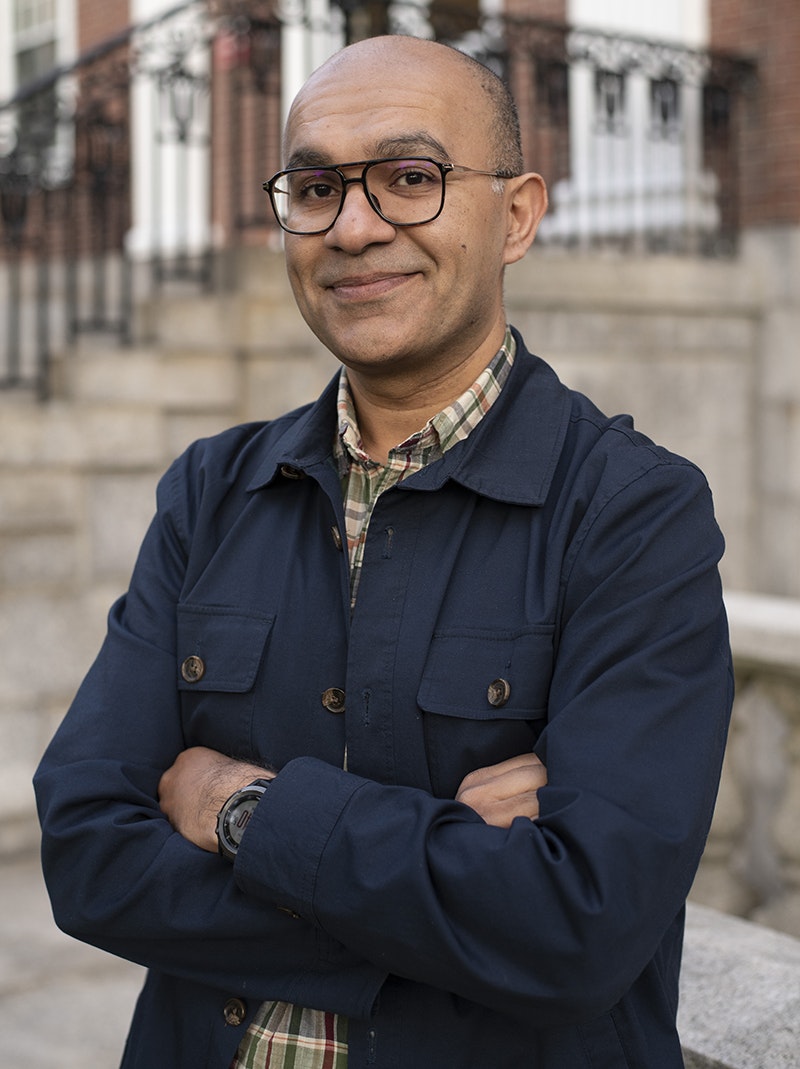Speaking to—and for—the People

Rahul Bhatia’s journey to becoming an independent journalist has always been led by creativity—and his curiosity about the lives of others.
Rahul Bhatia’s story is about pursuing your passions, even when others—or even you—can’t understand them.
His journey into the world of creativity began when he was just a teenager. “I started drawing, and writing, and exploring creative arts when I was about 12 or 13,” recalls Bhatia, the 2022–2023 Lisa Goldberg Fellow at Radcliffe. “My mother had heard me make some terrible jokes which she seemed to find funny, but they were not terrible.”
An English tutor fostered his interest in writing. “He would say, ‘Pick five words out of a dictionary. I want you to internalize the meaning of these words, and I want you to write sentences based on them,’” says Bhatia. “And then after doing that for a few weeks, he would get me to write op-eds. I was 12.” His passion for writing led him to publish his first piece: a letter to the editor about juvenile jails. However, his family had reservations about the arts and tried to steer him toward more traditional professions.
But Bhatia was determined to cultivate his talent. He applied to art school in New York, where he studied advertising. He graduated after 9/11, and the jobs in advertising dried up. He decided to pursue his career in India, where he found a vibrant and inventive advertising industry different from what he had seen in the Western world. “The advertising was more emotional in a certain way,” he says. “It appealed to your instincts, to your sense of humor, to the tropes that you’re surrounded by in your life. And I really loved what they were doing, so I stayed on in India.”
There, Bhatia started designing logos for popular Indian and global brands, but his love for cricket led him to consider being a sportswriter. It wasn’t just the game he was interested in; he was also curious about the sport’s international politics. He worked on a book about it for nine months but soon realized that writing and pulling all the pieces together weren’t as easy as they seemed. But rather than discouraging him, this hiccup only led him to discover the kind of journalism he wanted to do—thorough, bold, and personable journalism that spoke to and spoke for his audience.

Bhatia produces thorough, bold, and personable journalism that speaks to and for his audience. Photo by Tony Rinaldo
“I think I’ve always been interested in the question of how power is wielded in society,” Bhatia says. “At some level, we all write about power, but I think in places like India, it’s really important to take knowledge out of the realm of unknowingness and be explicit about it. And it’s nice to make things explicit especially in places where people don’t like things being made explicit. That’s the thing I think I really wanted to do.”
He broke out of traditional media and founded a start-up journalism platform, the Peepli Project, along with the National Geographic Explorer Arati Kumar-Rao, the Emmy-nominated filmmaker Kalyan Varma, and Prem Panicker, one of India’s finest editors. It became a safe space for creatives that shared the same vision. It’s had its successes but wasn’t always smooth sailing. Bhatia persevered and pursued stories he felt strongly about—like land acquisition and farm laws—and the website’s stories were well-received and earned an engaged following. But these stories took weeks to produce, and although they had found funding at the very beginning, Peepli needed more to keep going.
With bills to pay and a family to sustain, Bhatia returned to mainstream writing before landing a project that gave him more independence and flexibility. He explains that the idea for his first book, “The Identity Project,” on which he’s been working during his fellowship year, came by happenstance. A few of his friends were invested in India’s controversial biometric program, Aadhaar, and they encouraged him to investigate it. He had worked on a few technology pieces before, but they were nothing quite like this assignment.
He initially approached it very technically—but after a year and a half of research, “I admitted to myself that I was bored out of my mind,” he says. He began talking to people on the ground and realized that the conversations were not only about technology but also about religion, politics, governance, and, most important, people. This realization influenced and revolutionized his approach to his overall writing. In his most recent article published in the Guardian, “The Trials of Indian Witness: How a Muslim Man Was Caught in a Legal Nightmare,” he talks about India’s legal system and its lack of a robust witness protection program, especially in the cases of communal violence. In the process, he also touches on larger themes of religious and political tensions. However, Bhatia ably humanizes these seemingly abstract themes by still centering on real struggles experienced by his subjects.
“I’m more interested in people than I am in anything else. And through people, what can I learn about systems and places and processes and countries? What does the life of a person tell me?” he says. “The danger in this is that sometimes you can get reductive. When you use one person’s story to say, ‘Well, this is the story of everybody else.’ But I try not to do that.”
These narratives compelled Bhatia to see this project through. In his second attempt to write a book, he acknowledges being less nervous about the process, overcoming his initial fear of the writer’s block he previously experienced. He has more confidence, more reason, and more grit.
In the course of writing this book, Bhatia has continued to work as a freelance writer, taking on a number of writing jobs before coming to Radcliffe. In addition to producing reported pieces, he has worked as an editor and a ghostwriter and contributed to such reputable news outlets as Foreign Policy, the New York Times, and Reuters.
It was Bhatia’s wife who suggested he look for international programs that would allow him to work on the book. His admittance to the Radcliffe Fellowship Program proved a pivotal moment for his writing journey. While he was initially intimidated, the change in environment and the distance from his subjects provided the necessary inspiration to continue this work. With the support of the program and his family, Bhatia’s breakthrough year has turned into a life-changing experience that he believes will leave a lasting impact on him as a person as well as on his writing.
“It’s not always easy because the infrastructure for going off on your own and writing does not exist very much in places like India, where the concept of being a writer itself is seen as slightly dubious,” says Bhatia. “People look at you as if it should be a hobby, and they ask, ‘Where is your real work? How do you earn money?’ These are real questions that people have, and these are questions that make you ask yourself, ‘What am I doing?’ So I think you have to find different ways of doing it.”
Janine Robredo is a practicing medical doctor, a master’s candidate in global health delivery at Harvard Medical School, and an editorial intern at Harvard Radcliffe Institute.







